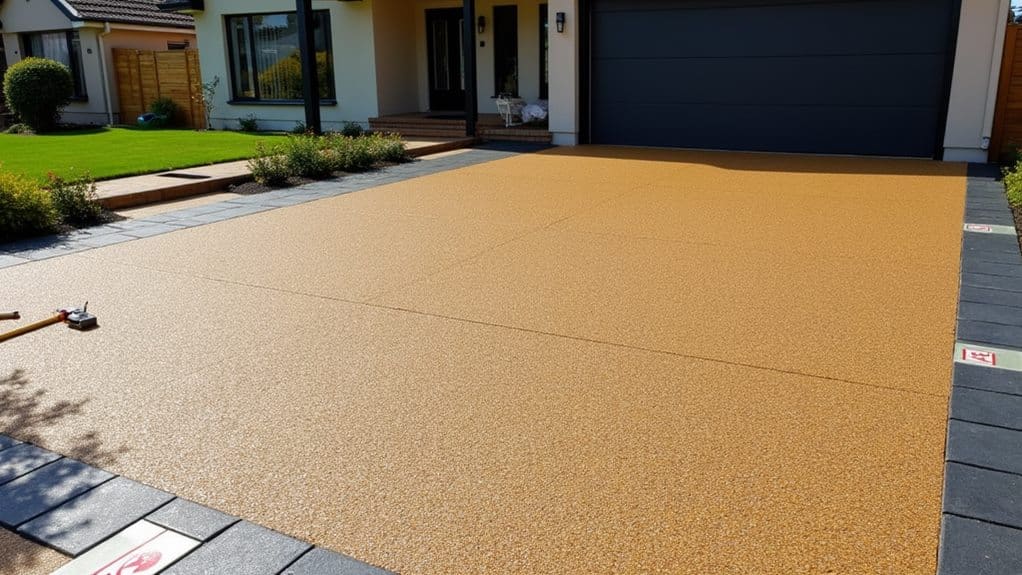Resin driveways cost £60-£120 per square metre in the UK, averaging £80/m². For a typical 50m² driveway, expect to pay £4,000-£4,500 all-in.
The final cost varies based on:
- Your existing surface condition
- Project size (larger areas often cost less per m²)
- Material quality
- Location within the UK
A skilled team of 3-4 contractors charges £150-£250 per day, with most installations taking 1-3 days.
Whilst pricier upfront than traditional surfaces, resin driveways prove cost-effective over their 25-year lifespan and need minimal upkeep.
Key Takeaways
Resin Driveway Costs at a Glance:
The average cost sits at £80 per square metre across the UK, though you'll pay between £60-£120 depending on your location. London and the South East typically command higher prices.
For a typical 50m² driveway (roughly enough for 2-3 cars), expect to pay £4,000-£4,500 all-in. This covers materials, groundwork and labour.
Larger driveways work out cheaper per square metre – much like buying in bulk at the supermarket. Contractors can work more efficiently and purchase materials at better rates.
Installation Timeline:
- 1-3 days for completion with a professional team
- 24 hours before walking on the surface
- 72 hours before driving
Ongoing Costs:
- Annual maintenance: £150-£300
- Resealing every 3-5 years: £10-15 per square metre
Worth noting that while the initial cost might seem steep compared to tarmac or concrete, resin driveways typically last 20+ years with proper maintenance.
Average Resin Driveway Costs
Resin driveways typically cost £80 per square metre in the UK, ranging from £60 to £120 based on specific requirements. It's worth using professional contractors to ensure proper installation and long-lasting results.
A standard 50-square-metre driveway costs between £4,000 and £4,500 for complete installation. Resin-bound systems cost more than resin-bonded ones, but they often provide better durability and finish.
Your existing driveway's condition heavily influences the final price. Damaged surfaces need extra preparation work, pushing up costs.
However, larger driveways often work out cheaper per square metre, as contractors can offer better rates for bigger jobs.
To budget accurately, consider:
- Driveway size
- Type of resin system
- Current surface condition
While the initial outlay might seem steep, particularly for larger areas, the long-term value and reduced cost per square metre often make it a worthwhile investment.
Material and Installation Options
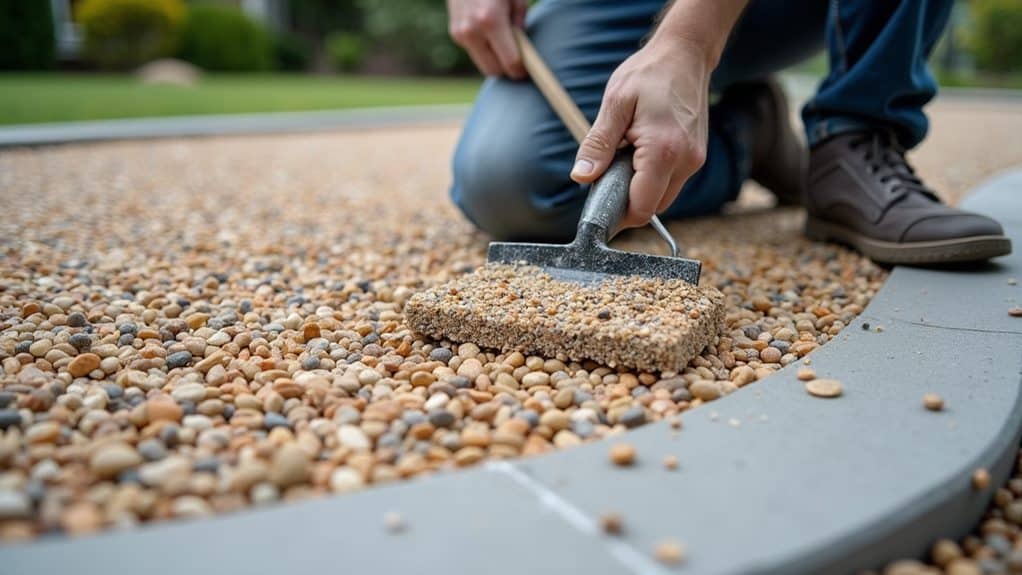
Material and installation choices significantly impact your resin driveway costs. For resin-bound systems, expect to pay £60-£120 per square metre, whilst resin-bonded options offer a more budget-friendly alternative. Your current driveway's condition matters too – you might need excavation or a new sub-base, adding to the total cost.
Well-installed resin driveways typically last over 25 years, making them a solid investment despite the upfront expense.
Labour makes up a substantial chunk of the cost, with daily rates between £150-£250. Your driveway's size and complexity determine how long the job takes and, therefore, the total labour costs. Optional extras like different aggregate colours and decorative patterns will enhance the look but boost the price tag.
Installing resin driveways demands experienced contractors who can properly prepare the surface and apply materials evenly. Your property might need extra groundwork, drainage fixes or edge details – all of which affect the final cost of your project.
Factors Affecting Price
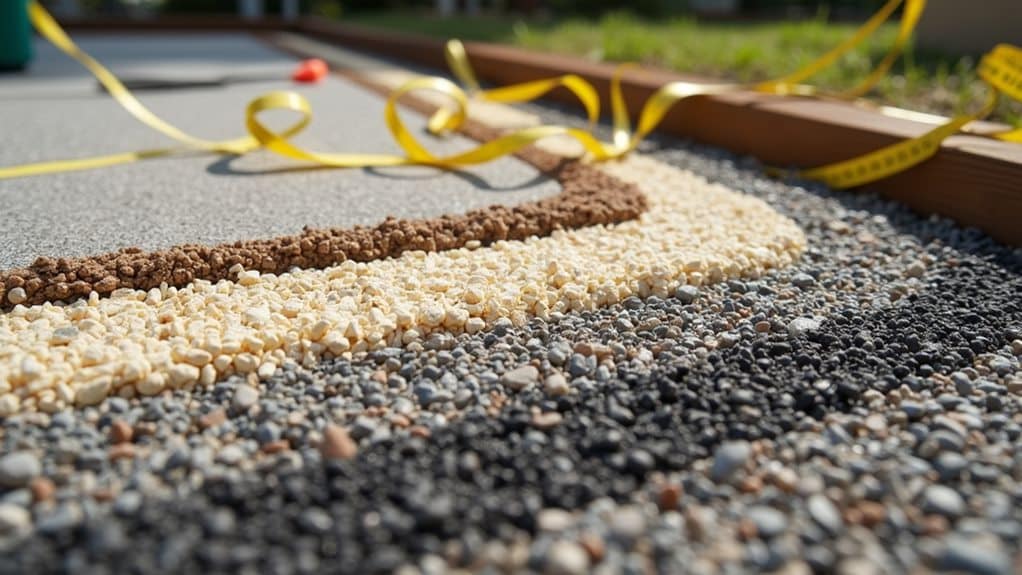
Key Factors Affecting Resin Driveway Costs
The typical resin driveway costs around £80 per square metre, though prices vary significantly based on several factors. Quality materials and proper installation are crucial for long-term durability, which affects the overall cost.
Your existing driveway's condition greatly impacts the price. A solid base means lower costs, whilst a surface needing extensive preparation work will cost more. Resin bound systems cost more than resin bonded ones due to their complex installation.
The choice of stones affects pricing – larger aggregates typically cost more than smaller ones. Bespoke patterns or unique colour combinations also increase costs.
Labour charges range from £150 to £250 daily, depending on your area and the installer's experience.
Location plays a major role in pricing, with installation costs varying from £60 to £120 per square metre across different UK regions. These differences reflect local labour rates, material costs, and specific site requirements.
Labour and Time Requirements
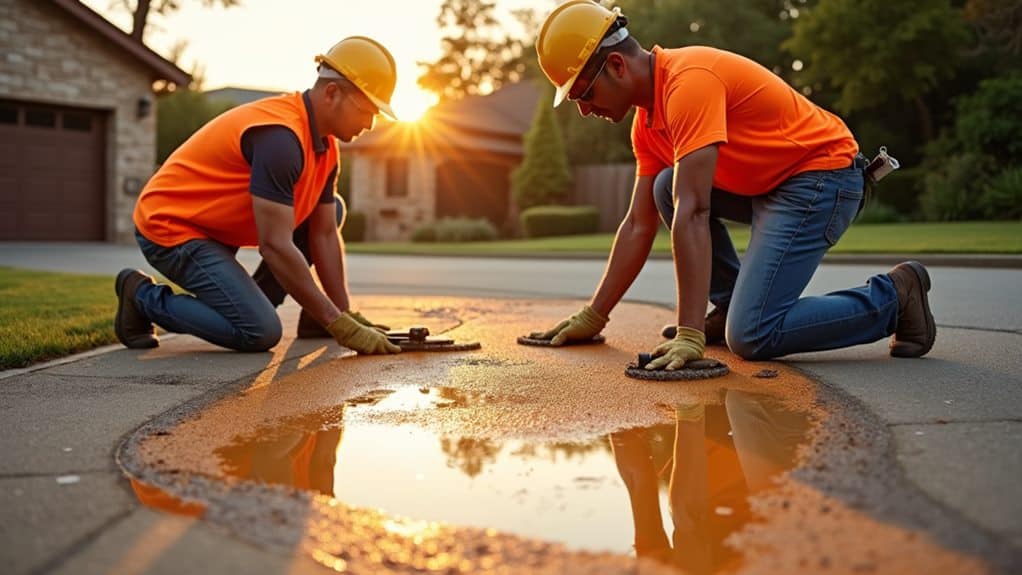
Labour and Time Requirements
Beyond basic costs, labour and time form major parts of your resin driveway budget. A skilled team of 3-4 contractors typically handles the installation, with daily labour rates between £150-£250. Your existing driveway's condition directly affects both timeline and costs.
Quality installation requires professionals using a forced action mixer (minimum 100kg capacity) for proper material blending.
Time and Labour Breakdown:
- Installation takes 1-3 days, longer if repairs or excavation are needed.
- Teams include specialists for each stage, from prep work to final resin pour.
- After installation, wait 24 hours before walking on the surface and 72 hours before driving.
An initial site assessment by your contractor will determine specific preparation needs, precise labour requirements and installation timeline.
Planning Permission and Regulations
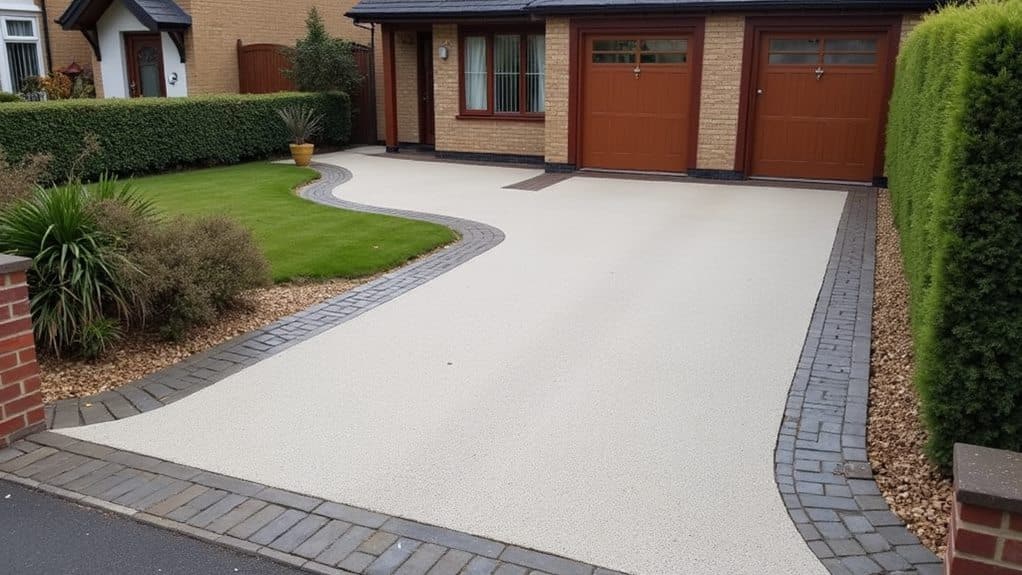
Getting planning permission for resin driveways is straightforward in the UK. You won't need permission if your resin-bound driveway is under 5m² and has a porous surface that meets SuDS (Sustainable Drainage Systems) requirements.
These surfaces naturally allow rainwater to drain through, reducing flood risks and pressure on storm drains.
Special rules apply in conservation areas and for listed buildings – check with your local council first. While resin-bound surfaces are typically compliant, resin-bonded driveways aren't naturally permeable and usually require council approval, adding about £20 to your costs.
Before work begins, review your local guidelines as they vary across different councils.
Though your contractor should know local building regulations, ultimately it's your job to ensure compliance. Keep all approval documents and make sure your installation meets current drainage standards to avoid future problems.
Maintenance and Longevity Costs
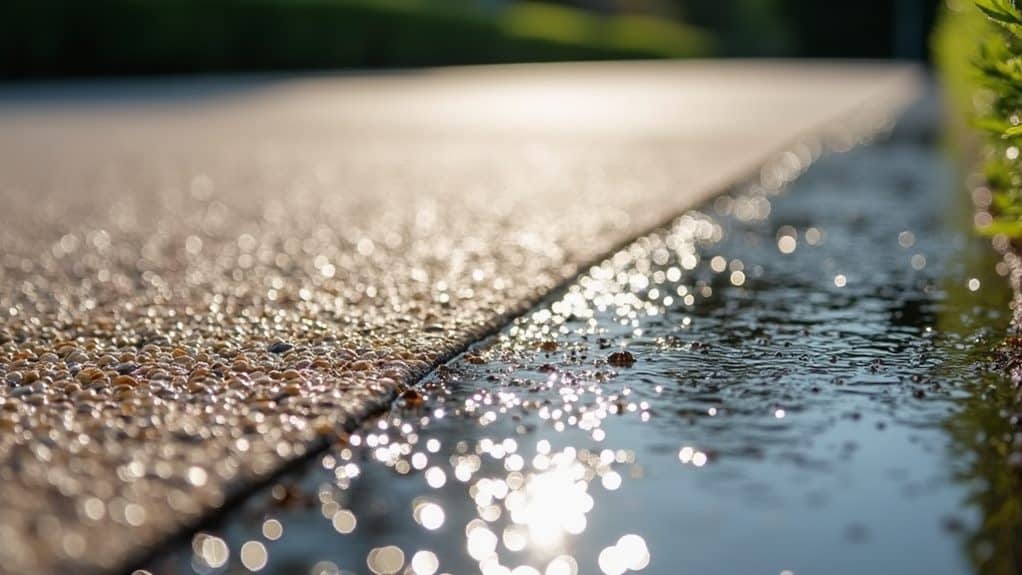
Maintaining a resin driveway needn't be complex, but it does require regular attention.
Expect to pay £150-300 yearly for professional pressure washing and checks. Monthly weed treatments and basic seasonal upkeep will protect your investment.
Every 3-5 years, budget for resealing at £10-15 per square metre – a worthwhile cost that prevents more serious issues down the line.
UV-stable resin and proper maintenance will push your driveway well beyond its typical 10-year lifespan, helping you avoid hefty repair bills that could top £1,000.
A bit of regular care now saves significant money later.
Routine Care Requirements
Resin Driveway Care Essentials
Regular maintenance significantly extends your resin driveway's lifespan beyond the standard 10-20 years, potentially up to 25 years.
Proper drainage systems prevent flooding whilst protecting your resin surface. Regular cleaning with a pressure washer removes dirt and stains, and UV-resistant resin prevents sun damage.
Key maintenance tasks:
- Check your driveway every few months for cracks or damage – sort small issues before they worsen.
- Pressure wash twice yearly to keep the surface clean and prevent material build-up.
- Apply a protective sealant every 2-3 years to guard against wear and maintain appearance.
Staying on top of maintenance costs far less than fixing major problems later.
Follow these care steps, and your resin driveway will look great and last longer.
Long-Term Cost Savings
Resin driveways offer significant cost savings over time compared to conventional surfaces like tarmac or concrete.
With a typical lifespan of 10-25 years, they represent a smart investment that cuts long-term maintenance costs. The impressive load-bearing capacity of 400 tonnes per cm² means the surface stands up well to heavy vehicles, reducing repair needs.
The initial outlay pays for itself through minimal upkeep requirements. Unlike traditional driveways, resin surfaces naturally prevent weed growth, eliminating the need for regular weedkiller treatments.
The weather-resistant nature means you won't face yearly repair bills from frost damage or cracking. Most owners find a simple pressure wash keeps the surface looking fresh, with resealing needed only every few years to maintain protection.
Overlay Versus New Installation
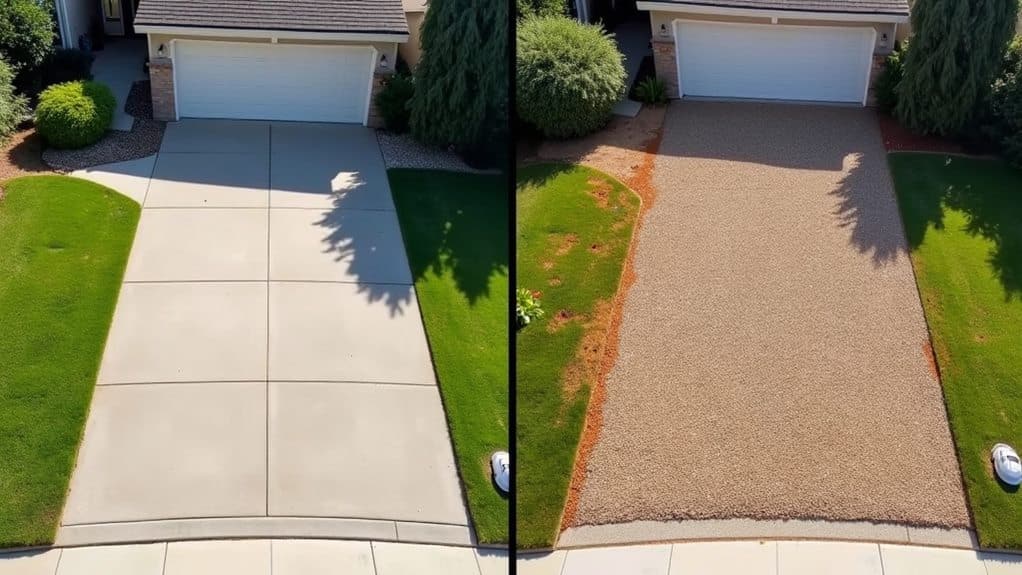
Comparing resin driveway costs, overlays cost £60-£120 per square metre, whilst new installations start at £80 per square metre plus groundwork.
A professional installer is essential to assess your existing surface and ensure lasting results.
If your current driveway is in good nick, an overlay could save you roughly 30% on the total cost.
However, any cracks, crumbling or structural issues mean you'll need a complete new installation, despite the higher price tag.
Think of it like re-carpeting versus replacing floorboards – you can only overlay when the base is solid.
Cost Differences Between Methods
Cost Differences Between Methods
Resin driveways come in two main price brackets. Overlays cost £60-£100 per square metre, whilst new installations range from £80-£120 per square metre. The difference stems from varying preparation work and labour requirements. Professional installation needs dry, warm weather, which can affect the final cost.
Key cost factors to consider:
- Overlay labour costs run £150-£250 daily, requiring less prep work and no extensive groundwork.
- Your existing surface condition matters – damaged bases need repairs or removal, potentially making new installations more cost-effective.
- Factor in long-term maintenance costs, as new installations often last longer despite higher upfront costs.
Whilst overlays seem cheaper initially, check your existing surface carefully. A new installation might save money over time, particularly if your current surface shows wear or damage.
Looking at total costs rather than just initial outlay ensures a sound financial choice.
Surface Preparation Requirements
Surface Preparation Requirements
Surface preparation is a key difference between overlay and new installation methods for resin driveways. For overlays, your existing surface must be structurally sound to support the new resin layer. This means thorough inspection, cleaning, and repairing any cracks or surface defects to ensure proper bonding.
Pressure washing and a full 24-hour drying period are crucial before laying the resin.
New installations require more extensive groundwork. You'll need to excavate the area and install a proper sub-base. This step is vital for ensuring correct drainage and water permeability – much like preparing a foundation for a house.
Without it, you risk water pooling and surface damage.
Both methods have specific preparation needs that will make or break your project. Overlays cost less and take less time, but only if your current surface is up to scratch.
If you've got major damage or drainage problems, you'll likely need a full new installation with excavation.
Whether you choose overlay or new installation, proper drainage and surface stability are non-negotiable for lasting results.
Regional Price Variations
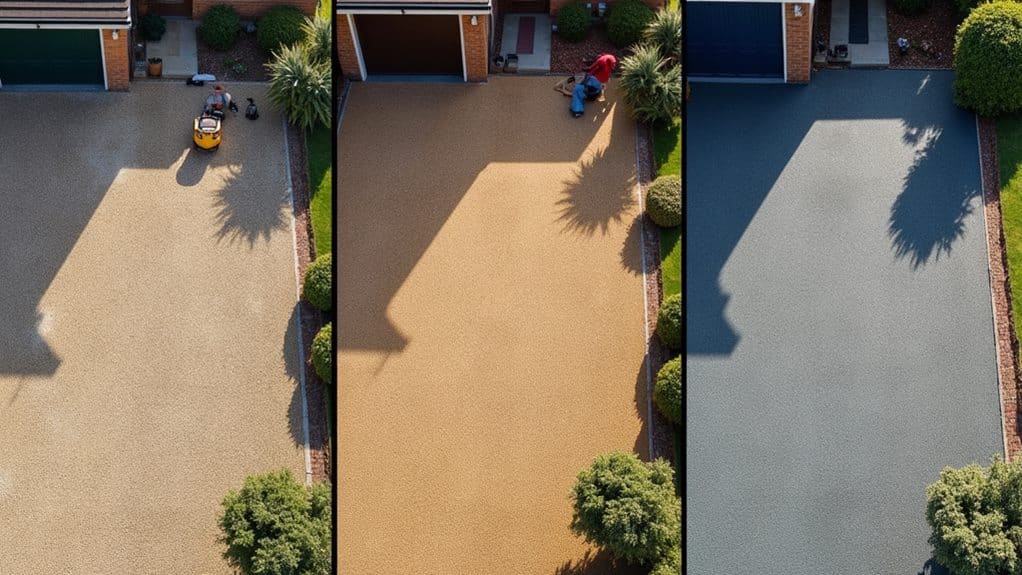
Regional Prices Across the UK
Resin driveway costs vary significantly throughout Britain, ranging from £60 to £120 per square metre. London and other major cities tend to cost more due to higher labour rates, whilst rural areas often offer better prices but have fewer qualified installers.
Key factors affecting your local price:
- Local competition and skilled labour availability
- Distance from suppliers (affects delivery costs)
- Time of year (winter installations often cost less)
To get the best value:
- Gather at least three quotes from local contractors
- Check reviews and previous work examples
- Don't automatically choose the cheapest quote
- Ask about material sourcing and warranties
Though prices vary by region, resin driveways prove cost-effective thanks to their durability and minimal upkeep needs.
Quality installation matters more than finding the lowest price, so prioritise experienced contractors with solid local track records.
Additional Design Elements
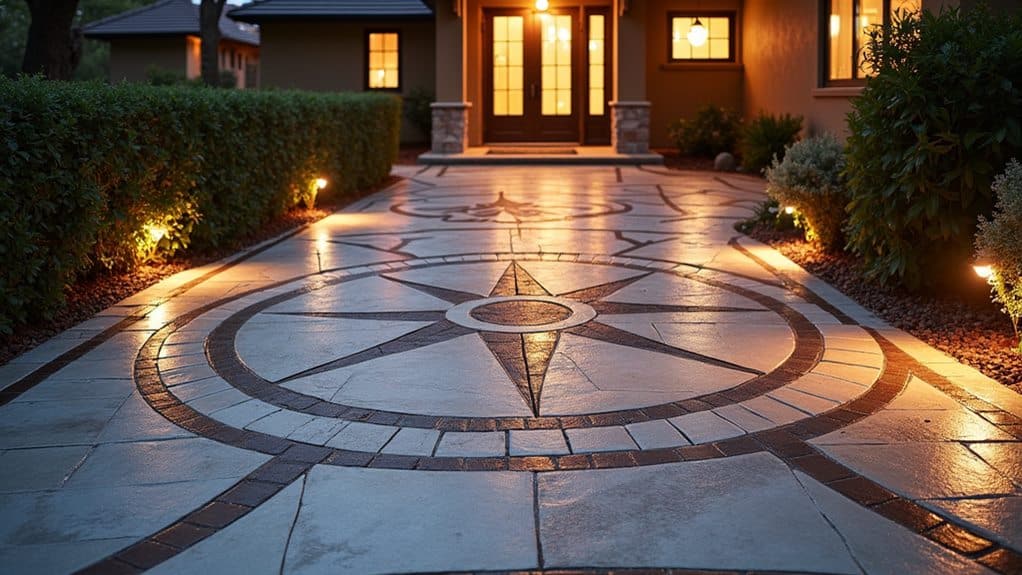
Design elements transform a basic resin driveway into a standout feature of your property, with various options affecting both looks and costs. The choice of aggregate colours and sizes impacts both appearance and function. Larger aggregates improve drainage but typically cost more.
Resin driveways offer excellent long-term durability and customisation options, making them a solid investment for your property.
Decorative edging, such as brick or metal pin kerbs starting at £25 per metre, defines your driveway's boundaries whilst adding visual interest. Complex patterns or custom designs increase installation costs due to extra labour and materials.
These detailed designs need more time and specialist skills to install properly.
Practical additions like inset manhole cover trays cost around £250 each and take three hours to install. They blend seamlessly with your chosen design whilst maintaining access.
Remember that each design feature affects the total cost, but they're vital for creating a driveway that's both attractive and practical.
Frequently Asked Questions
How Much Does a Driveway Cost per M2 in the UK?
Driveways in the UK typically cost around £80 per m2, though prices fluctuate between £60-£120. The final cost depends on your choice of materials, how tricky the installation is, and where you live. This price covers both labour and essential groundwork.
What Are the Pitfalls of Resin Driveways?
Resin driveways present several drawbacks worth considering. UV rays can fade the colour over time, whilst extreme British weather conditions may cause surface cracking, particularly during winter freeze-thaw cycles. Meeting local drainage regulations can be tricky, as some councils require sustainable drainage solutions. Installation demands expert knowledge – it's not a DIY job. Regular maintenance includes moss removal and occasional resealing, especially in damp areas. Worth noting that these surfaces can become slippery when wet, much like traditional paving, and non-permeable versions may contribute to local flooding issues during heavy rainfall.
How Much Resin per Square Meter?
For bound resin surfaces, expect to use 15-20 kg of resin per square metre. Bonded systems typically need a bit less. The exact amount varies based on your chosen resin type, aggregate size and desired finish depth.
Is a Resin Driveway Cheaper Than Block Paving?
Though resin driveways cost more initially (£60-£120/m²) compared to block paving (£50-£100/m²), they prove more cost-effective over time. The savings come from lower maintenance costs, quicker installation time and better durability, which means you won't need to replace your driveway as often.
Conclusion
The cost of a resin driveway typically ranges from £40 to £100 per m². This significant investment in your property involves several key factors that affect the final price: ground preparation, resin quality and your location's labour rates. Much like choosing home improvements, prices vary based on your specific requirements and site conditions. A properly installed resin driveway should last 15-20 years with standard maintenance, making it a practical long-term choice for UK homeowners.
